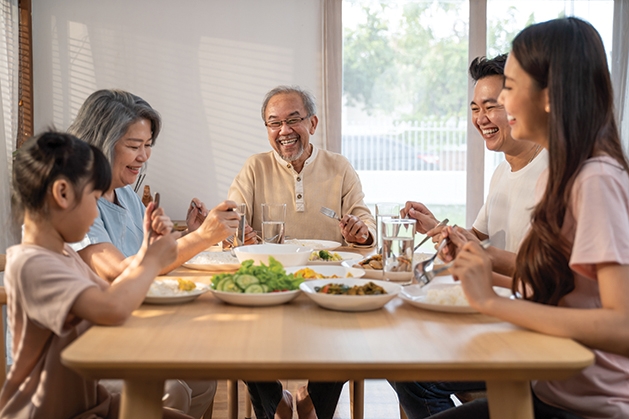
Some of our most memorable meals are the ones we enjoy with loved ones. How does this impact the elderly who eat alone? According to a nationwide study from Home Instead, a home care service for older adults, seniors who eat most of their meals alone are twice as likely to feel lonely compared to those who enjoy companionship at mealtime—leading to feelings of isolation and poor eating habits. Additionally, lonely seniors skip more than 20 percent of their meals each year.
Cher Kuechle, owner of Home Instead Edina, emphasizes the impact those feelings have on people’s health. “Loneliness can disrupt eating habits and lead to less nutritional sources,” Kuechle says. “A healthy diet contributes significantly to overall physical, mental and emotional health. Enjoying meals with loved ones can improve nutrition and reduce feelings of depression.”
In response to the study, Home Instead launched the Companionship Diet, a free online program designed to demonstrate the health benefits of enjoying meals together. It offers educational resources, recipes and tips to make more informed nutritional choices, and it seeks to inspire seniors and family caregivers to spend quality time together preparing and sharing healthy meals.
“The study found that 72 percent of lonely seniors wish they ate more meals with loved ones, so they are craving that companionship,” Kuechle says.
Kim Pearson, RDN, LD, CFPM, lead dietitian for Ebenezer Senior Living, serving Aurora on France and York Gardens, understands the correlation between human connection and health issues related to poor nutrition. “Make sure you’re scheduling time ... to see each other at least once a week,” Pearson says. “Be sure they’re getting that serotonin released just by seeing happy faces smiling at each other.”
Both aging experts share tips on how families can include seniors during mealtime, even if only via technology like Apple FaceTime.
Plan simple, healthy meals. Ask for their preferences and recipes.
- Involve them in the preparation.
- Make nutritious fruit and vegetable smoothies. Fiber up! Add flaxseed.
- Schedule regular meals or coffee dates. Include other family members.
- Include important vitamins and nutrients. Talk to their regular health care provider about what’s suitable.
- Celebrate special occasions like birthdays and anniversaries.
- Avoid prepackaged frozen meals, which are high in sodium. Share frozen homemade meals.
- Share your gardening and canning harvest. Better yet, involve them in the process.
- Ask them to bake with you, sharing their favorite recipes.
- Send a pretty bouquet of flowers for their table.
- Help them stay hydrated by giving them a quality water bottle.
- Order grocery, meal or restaurant delivery services.
- Enjoy a meal outdoors and soak in the sunshine and vitamin D.
If you are eating alone and craving mealtime companionship:
- Tell your family and friends you are open to enjoying mealtime together.
- Host an intimate group of friends or neighbors for a meal or tea. Utilize community space if available.
- Start a baking or cultural meals group with friends, neighbors or your church.
- Swap cooking-for-one ideas and recipes.
- Form a monthly dinner club. Share Minnesota-style: potluck.
- Socialize at community or senior centers that serve meals.
Anyone can ensure that aging loved ones feel connected during mealtime, improving emotional and mental well-being, one meal at a time. Companionship Diet resources can be found at homeinstead.com/companionshipdiet.
Home Instead Edina
4445 W. 77th St. Suite 121
952.929.5695
homeinstead.com/167
Home Instead (Edina MN)
@homeinsteadedina
@homeinstead









